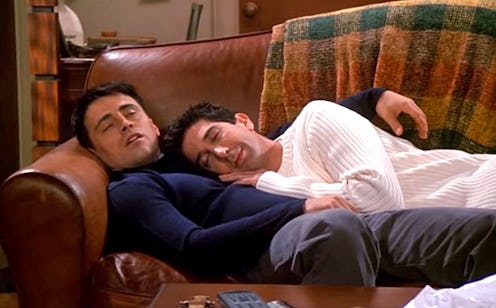Life
8 Things That Happen To Your Body When You Dream

Sleep: that sweet relief after a long day of working at being the best you that you can be. It's a reward for being up the rest of the day, interacting with other people, working and doing remedial tasks. Sleep is my favorite thing, and you can quote me on that. But while I love sleep, like musical talent, it does not come easily to me. I put a lot of effort into sleeping. When I was younger I would stay up for hours, my mind unable to rest for a second. I would obsess over tests and papers. I am still a crappy sleeper, but I learned to manage it by putting in my headphones and listening to something. I didn't know how good I had it. I still yearn for that amazing true sleep I used to get. (True sleep is the sleep you get after a night of drinking with your friends with no special occasion in sight. That sleep was magical.)
When it comes to sleep, I've rarely had time to research what happens throughout the night to my body. My most pressing questions have always had to do with my dreams. I never knew what they were for or what they did. Luckily the internet exists, and information is out there. So grab a notebook and start taking notes, because below is what happens to your body when you dream.
1. Your Eyes Twitch
This happens during the first phase of sleep that you will be going through. In this stage you are actually very susceptible to being awoken.
2. Your Body Gets The Rest It Deserves
After Phase One, you move into Phase Two of your sleep cycle. Your body temperature drops and you go off into that sweet world of sleep. Usually for me, this is the part I wake up quickly from and feel all clammy. While in this stage, your brain function is reduced and your blood pressure slows down as well. The reason for this is that your heart and vascular systems are getting a break to recharge while you doze off. I love that our bodies know that we need to recharge for the next day. With this phase your body finally gets the much deserved rest it needs — the kind of rest that is particularly at hand when you're dreaming.
3. You Restore Your Energy and Secrete Hormones
According to the National Sleep Foundation, this is the third phase of sleep and the part of your cycle where blood supply to muscles increases and hormones are released — particularly growth hormones, essential for muscle development. Thanks in advance, any and all sexy dreams about Chris Pratt.
4. REM, Baby, REM
This is the fourth phase of sleep and the one that's most interesting to me. REM, baby! Unfortunately this does not mean that the band REM appears in your dreams but more so that your breathing and heart rate vary, and you enter a state of temporary paralysis. So while you're out saving the world in your dreams, you're actually barely moving at all. Freaky, huh?
5. Lucid Dreaming
This happens while you are dreaming during phase four of your sleep cycle. Lucid dreaming is the awareness that a person has that they are dreaming. It can mean that you wake up immediately, or that you start controlling what you do inside of the dream. I've had this happen twice and each time I decided it was a good idea to fly.
6. Sleepwalking
This does not happen to everyone, but it can happen to those who are sleep deprived. Basically, during REM your body should be paralyzed enough that you are not acting out your dreams. Unfortunately, that doesn't always happen. That's were sleepwalking comes in.
7. Therapy
So while your heart rate drops your muscles relax and your restore your overworked body, the mind does the same thing to your thoughts. Dreaming is like free therapy. You work through your emotional issues.
8. Nocturnal Emissions
Yup. Otherwise known as a "wet dream," this could happen too — whether you're male or female. BUT despite everything you gleaned from pop culture as a kid, this is totally normal, even in adulthood. Just in case you thought you were just making it up in your head, it really does happen. Researchers measured women experiencing sleep orgasms, and detected a jump in their heart rates from 50 to 100 beats per minute and an increase of breathing from 12 to 22 breaths per minute. Bow chicka WHAT.
Images: NBC; Giphy